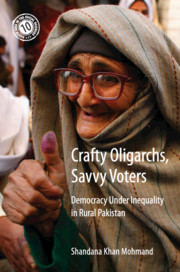Book contents
- Frontmatter
- Dedication
- Contents
- List of Tables and Figures
- Acknowledgements
- Glossary of Local Terms
- 1 Introduction: Rural Voters under Inequality in an Emerging Democracy
- 2 Colonial Constructs and Post-colonial Politics: 1849–2018
- 3 Landed Power in Sahiwal: From Domination to Intermediation
- 4 Local Competition and Bargaining Power: Conceptualising Political Engagement in Rural Punjab
- 5 Bargaining with Landlords: Comparing Political Engagement in Unequal Contexts
- 6 Structural Inequality and Variations in Political Engagement
- 7 When Do Shifts in Political Engagement Occur?
- 8 Conclusion: The Future of Pakistan's Democracy
- Annex 1 Chronology of Political Events in Pakistan
- Annex 2 Index of Political Engagement (IPE) Scores for 38 Villages
- Annex 3 Research Instruments
- Annex 4 Detailed Descriptions of Household Variables Used in Multivariate Regression Analysis
- Bibliography
- Index
5 - Bargaining with Landlords: Comparing Political Engagement in Unequal Contexts
Published online by Cambridge University Press: 26 April 2019
- Frontmatter
- Dedication
- Contents
- List of Tables and Figures
- Acknowledgements
- Glossary of Local Terms
- 1 Introduction: Rural Voters under Inequality in an Emerging Democracy
- 2 Colonial Constructs and Post-colonial Politics: 1849–2018
- 3 Landed Power in Sahiwal: From Domination to Intermediation
- 4 Local Competition and Bargaining Power: Conceptualising Political Engagement in Rural Punjab
- 5 Bargaining with Landlords: Comparing Political Engagement in Unequal Contexts
- 6 Structural Inequality and Variations in Political Engagement
- 7 When Do Shifts in Political Engagement Occur?
- 8 Conclusion: The Future of Pakistan's Democracy
- Annex 1 Chronology of Political Events in Pakistan
- Annex 2 Index of Political Engagement (IPE) Scores for 38 Villages
- Annex 3 Research Instruments
- Annex 4 Detailed Descriptions of Household Variables Used in Multivariate Regression Analysis
- Bibliography
- Index
Summary
Sahiwal is a very unequal village in which the original proprietary landlords are in control of village politics, but where voters have used a combination of opportunities – access to non-farm jobs, education, political enfranchisement, linkages with external political actors – to expand the political space available to them inside the village. Sahiwal leaves us with questions about the extent to which a similar pattern of politics is replicated in other nearby villages in Sargodha district – does Malika's control of Sahiwal's politics reflect the way old landed families operate politically in other types of villages too? And are a middle strata of upwardly mobile voters and political entrepreneurs equally visible elsewhere?
As explained in the initial chapters, district Sargodha has different types of villages across which land inequality and social structures vary. We have so far observed politics in a village that was originally settled as a large zamindari grant (though converted to a pattidari one soon after) and has always been very unequal, but it is close to the town of Shahpur where many of its residents now work. How is politics organised in a village that was a Crown colony, or where land was distributed more equally at the time of settlement, or one that lies deep inside the district, far away from its growing towns? In other words, to what extent do differences in levels and types of inequality condition local political competition and the bargaining power of voters in Sargodha's villages?
In this chapter, I look at political outcomes in five case villages that are different from Sahiwal along specific dimensions of socio-economic inequality, outlined in Table 5.1. My primary interest here is in understanding differences in political organisation across Proprietary and Crown villages – the two major types of colonial land settlements that created socially and economically unequal structures and institutions in rural Punjab – though there are differences within these two broad types of villages. Some are more unequal than others, and some offer greater opportunities for upward mobility than others through their proximity to urban centres. We selected case villages that could offer us a sense of how political engagement can vary across these different contexts.
- Type
- Chapter
- Information
- Crafty Oligarchs, Savvy VotersDemocracy under Inequality in Rural Pakistan, pp. 155 - 189Publisher: Cambridge University PressPrint publication year: 2019



